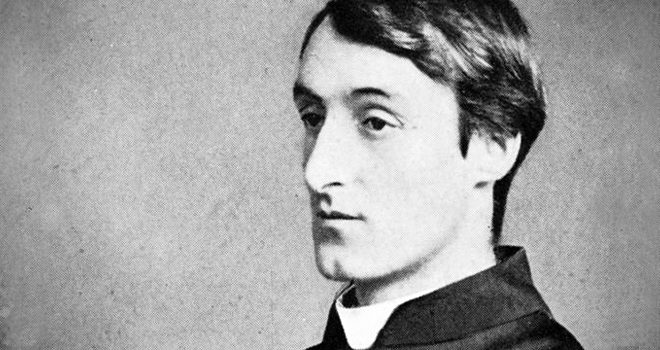By Gerard Manley Hopkins
Part 5 ( verses 9-10) ( 1-08-2020)
9.Be adored among men,
God, three-numberéd form;
Wring thy rebel, dogged in den,
Man’s malice, with wrecking and storm.
Beyond saying sweet, past telling of tongue,
Thou art lightning and love, I found it, a winter and warm;
Father and fondler of heart thou hast wrung:
Hast thy dark descending and most art merciful then.
The poem upto verse 8 dealt with the storm in man . Verses 9 and 10 are transitional, preparing the reader for the “man” in storm, (here it is a woman, “ the tall nurse”) in Part Two of the poem .
“Be adored among men/God”: God is adored, for what? For his double role, “Father and fondler of heart thou hast wrung” . The father who fondles is also the father who “wrings” the rebel who is stubborn in malice , (“dogged in den”) . He wrings “with wrecking and storm” in order to make him mend his ways, and ask for His mercy. Part One was the poet’s personal encounter (“ I found it”) with God’s dual aspect, “Thou art lightning and love, I found it, a winter and warm”.That personal encounter was beyond words,”Beyond saying sweet, past telling of tongue”. ( The same inexpressibility was expressed in v.2 “truer than tongue confess”). The dual aspect of God is the theme of this poem,and is expressed in this verse in paradoxical terms, ‘lightning and love’, ‘a winter and warm’, ‘Father and fondler’. What is to be noted here in this verse is the poet is praying for the wrath of God and to wring the “dogged in den” into an awareness of the need of God’s mercy. “Wring” in “Wring thy rebel” is a prayer in the imperative form. ( You “wring” 1.a wet cloth to remove the moisture, or wring, for example the neck of a person to cause pain. ) From his personal encounters with the “mastering” God , the poet moves on to the suffering of the five nuns on the ship coming in the form of a storm,(‘dark descending’) in the next part of the poem. And their suffering reveals the truth about God’s wrath . God’s wrath is part of his “mastering” man to prepare him for His grace. (The poem begins with “Thou mastering me / God!” ) But once God’s mastering is done,wrath is replaced with soothing, “most art merciful then” .
10. With an anvil-ding
And with fire in him forge thy will
Or rather, rather then, stealing as Spring
Through him, melt him but master him still:
Whether at once, as once at a crash Paul,
Or as Austin, a lingering-out swéet skíll,
Make mercy in all of us, out of us all
Mastery, but be adored, but be adored King.
Always let us remember Hopkins’s words that his poetry is to be read , and by implication to be heard .Here, we hear the “anvil-ding”.
(In The Windhover, Hopkins split the word “kingdom “ to herald the second line with a “king/-dom” :
“I caught this morning morning’s minion, king-
dom of daylight’s dauphin” )
God wears many forms while redesigning man for his higher purposes. In the opening verse of this poem we have seen him take up the role of a mason (“Thou mastering me”, master,maistrie). Here in this verse he is donning the role of a smith, “With an anvil-ding /And with fire in him forge thy will”. God is burning (“ with fire in him” ) with the desire to forge man’s will towards a higher purpose.( The image of smith is also found in his poem “ Felix Randal”). Now, God stands up and moves away from his furnace. (Does he too feel the heat of the furnace far too much! After all, he is working on his dear devotee!) He now comes “stealing as Spring /Through him”. God’s Grace comes “ Stealing”, for man doesn’t know when his winter was worn and Spring has taken over. ( or winter “done” , as Hopkins says in another poem (“Carrion Comfort”), “ done darkness”: ).
But when does this Spring steal through you? “Or rather, rather then”, when you feel the heat too much, when God thinks you cannot take any more heat.
God is at his job of mastering man, moulding man, and he does this in two ways. He melts you in the smouldering furnace, and also melts in the form of Spring, “melt him but master him still”. But this mastering may be done “at once, as once at a crash Paul,Or as Austin, a lingering-out swéet skíll ”. Paul ( his Jewish name was Saul) persecuted many Christians, and was temporarily blinded by God. Jesus spoke to him, and he was converted. The conversion in his case was violent and instant, a “crash”.But in the case of Austin ( Augustine) the conversion was the result of a long “lingering-out swéet skíll” of Bishop of Milan. Augustine’s was a gentle progress, unlike the violent conversion of Paul.
Verses 9 and 10 largely dealing with the storm in man, conclude the first part of the poem. This part is lyrical . The second part, the more narrative part, describes man/woman in storm, the wreck,and the regeneration.
Titbit:
Hopkins was sent to Wales to study theology at St. Bueno’s. In a letter to his mother,he wrote that he warmed to the Welsh in part because he considered himself to be half Welsh. In a Letter to Baillie, Hopkins wrote: “ I have learnt Welsh as you say: I can read easy prose,and can speak stumblingly,but at present I find the greatest difficulty, amounting mostly to total failure,in understanding it when spoken and the poetry, which is as hard as the choruses in Greek play–and consider what those would be with none but a small and bad dictionary at command–I can make little way with.” (Hopkins in a Letter to Baillie). But it is recorded elsewhere that Hopkins was warned that he could learn Welsh only if he wanted to convert the Welsh to Catholicism, he gave up learning Welsh,for he couldn’t claim he wanted to convert.
Hopkins didn’t believe that conversion is man’s job.
-continued.









Add comment